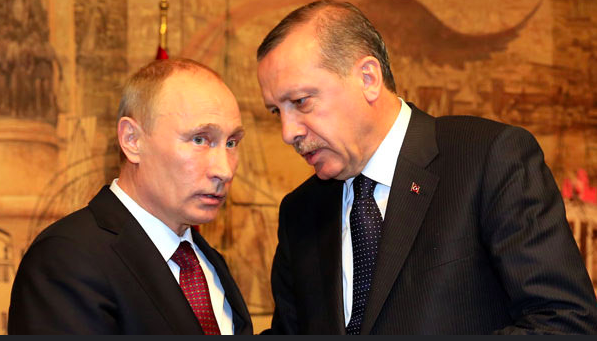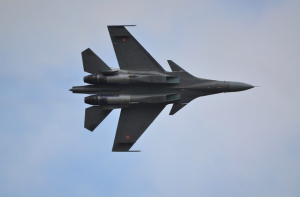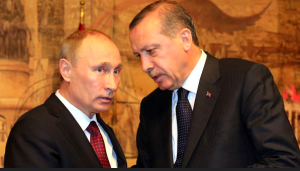How Moscow Will Lose Ankara
 Relations between Moscow and Ankara have been friendly in the past.
Relations between Moscow and Ankara have been friendly in the past.

On September 30, President Vladimir Putin stunned the international community with the deployment of Russian armed forces in Syria. After nearly five years of supporting the faltering regime of Bashar al-Assad since the eruption of the civil war in 2011, this formal show of Russian military force appears to be the next logical step in Putin’s ever-increasing involvement in Syrian affairs. Although this turn of events has come as a surprise to many Western leaders—including US President Barack Obama— President Putin has been bolstering Assad’s forces for quite some time, including effectively building surrogate air and army forces for the Assad regime. Russia has also, in recent months, expanded its presence in the Caspian Sea, installing an impressive flotilla that has already conducted a series of strikes against supposed rebel forces. During an interview with Russian state television, Putin has claimed “our task is to stabilize the legitimate government and to create conditions for a political compromise…by military means, of course”. In essence, the expanded Russian presence in Syria has been a long time coming: Russia has been involved in coordinating a campaign to prevent the fall of Bashar al-Assad for quite some time. What should be considered as most concerning is not this recent development, but rather the extensive set of geopolitical implications that are coming in hand with the expansion of Russia’s footprint in the region. Particularly, the world should turn its attention to neighboring Turkey, and pay attention to the heightening tensions between Presidents Erdogan and Putin.
As of late, the Russian Federation and the Republic of Turkey have enjoyed a mutually-beneficial relationship. While the West has shunned Putin’s actions in Ukraine and the Crimea, Turkey’s leadership has not estranged itself from its Russian neighbors. Economic ties bind the two states together: Turkey stands as the second-largest consumer of Russian natural gas and petroleum. Russian consumers, in turn, rely on Turkish agricultural goods and textile products. In 2014 alone, trade between the two states amounted to 31.6 billion USD. Talks of the construction of a massive Black Sea oil pipeline and a 20 billion USD nuclear power plant on the Mediterranean have been in the works over the past year. But this friendly dynamic now appears to be souring. Current strains regarding the war in Syria jeopardize the Russian-Turkish economic and political relationship. President—and former Prime Minister— Recep Tayyip Erdogan has warned of the termination of these energy contracts, and has also stated that Turkey has the ability to seek alternative sources of foreign energy. This dramatic change in attitude has come about suddenly, although Turkey has been long aware of Russian involvement in Syria. Turkish leadership has even restrained its disapproval of the Russian arming on the Kurds in Syria, a stateless national group with which Turkey has long been in conflict. In the eyes of the Turks, the escalation of Russian military involvement in the Syrian Civil War is not the issue. Rather, Russia’s recurring intrusions into Turkish airspace are what has elicited Turkish indignation.

Within the past few weeks, Turkish sources have reported that Russian warplanes have encroached on Turkish airspace, unannounced, and without prior authorization. These encounters have come after the Turkish government has expressed interest in establishing a no-fly zone near the border with Syria. But, recent Russian actions display a clear disregard for this Turkish intention. In addition, American forces conducting airstrikes against ISIS from bases in southern Turkey have also come into close contact with Russian warplanes that have, again, been found in Turkish airspace. American and Russian jets have come as close as within 20 miles of one another— a huge surprise for both American and Turkish officials. In recent weeks, Turkish officials have also claimed their patrol planes along the Syrian border have been harassed by Russian forces. And, to make matters worse, on October 16th, the Turkish air force shot-down an unidentifiable drone that entered Turkish airspace. After the drone failed to respond to repeated warnings and requests to leave Turkish territory, the Turks were left with no alternative to downing the drone. Although the Russian military has since denied that the drone is of Russian origin, the veracity of that claim is in question. This comes at inconvenient time for the Russians as data has recently been released that reveals Russian equipment shot down the Malaysian Airlines flight last year over Ukraine. (Although the Russian state is not necessarily to blame, all possible permutations need to be considered). It is quite likely the device was used to gauge Turkish determination to protect its airspace in the event of a breach. And, the Turkish reaction was swift. Currently, Turkish forces are in the process of identifying the origin of the unmanned aircraft found within their jurisdiction.
Turkey is struggling to remain patient. Repeated Russian violation of Turkish airspace is not merely a Turkish concern: it has great potential to upset the international balance of power. Whenever a vague construct such as international waters or airspace comes into question during a time of war, competing powers can come one mistake, one misunderstanding, or one deliberate maneuver away from full-blown conflict. Clearly, Russia’s recent displays of force are creating needless friction with the Turkish government. Within the context of the Syrian Civil War, Turkey and Russia already lay at opposing sides of the issue, with Turkey backing the Free Syrian Army and the other rebel groups fighting against the Russian-backed Assad regime. This alone provides the basis for further conflict given that Russia has now formally installed troops in Syria and that the majority of Russian airstrikes in Syria have targeted not ISIS, but various rebel groups fighting to dislodge Russia’s client, Assad, from power.
Russia’s disregard for Turkish airspace and authority does not only have domestic repercussions: it poses an imminent threat to global security. Turkey is member of NATO; it enjoys a well-established relationship with twenty-seven other member states, including major Western powers. This is where the greatest concern lies. Recent interactions have caused NATO Secretary General Jens Stoltenberg to comment on the issue stating: “I will not speculate on the motives, but we have seen…violations of Turkish airspace. The intelligence that we have received provides me with reason to say it doesn’t look like an accident”. NATO, its member states, and Turkey clearly would wish to avoid military confrontation with Moscow. Yet Russian military escalation in Syria is clearly becoming riskier, and perhaps less oriented toward the long-term success of the Assad regime. There is no question that other motives lie at the root of Russian involvement.
Although there is no possible way of predicting what the tension between Russia and Turkey will escalate to, Russia should be advised to tread carefully. Continued disregard for Turkish sovereignty could have dire foreign policy consequences for Putin, and could trigger dangerous consequence at a global scale.
Works Cited
Dyer, Geoff, and Kathrin Hille. “FT Big Read: The Battle for Syria.” The Financial Times (London, United Kingdom), September 28, 2015, 9-10.
Fraser, Suzan. “Turkey downs drone as Syria launches Aleppo offensive.” The Globe and Mail. http://www.theglobeandmail.com/news/world/drone-shot-down-around-in-turkish-airspace-official/article26839853/.
Gardner, David. “Russia’s adventure in the Middle East is as dangerous as America’s.” The Financial Times (London, United Kingdom), October 3, 2015. Accessed October 14, 2015. http://www.ft.com/intl/cms/s/0ee68cc4-6c34-11e5-8171-ba1968cf791a
Rachman, Gideon. “We Must Compromise with Evil in Syria.” The Financial Times (London, United Kingdom), September 21, 2015. Accessed October 20, 2015. http://www.ft.com/cms/s/0/96bf7e48-6041-11e5-a28b-50226830d644.html.
Service, Robert. “This is not a new cold war but something more dangerous.” The Financial Times (London, United Kingdom), September 23, 2015. Accessed October 7, 2015. http://www.ft.com/intl/cms/s/0/905f29de-610b-11e5-9846-de406ccb37f2.html#axzz3pnM7QJ1M.
Shaheen, Kareem. “Turkey ‘cannot endure’ Russian violation of airspace.” The Guardian (London, United Kingdom), October 6, 2015. Accessed October 16, 2015. http://www.theguardian.com/world/2015/oct/06/nato-chief-jens-stoltenberg-russia-turkish-airspace-violations-syria.
Skalamera, Morena. “A Kink In the Pipeline:Why Turkish-Russian Gas Diplomacy Won’t End Well for Ankara.” Foreign Affairs. Last modified October 11, 2015. Accessed October 14, 2015. https://www.foreignaffairs.com/articles/turkey/2015-10-11/kink-pipeline.
Photo credit to Flickr Creative Commons
